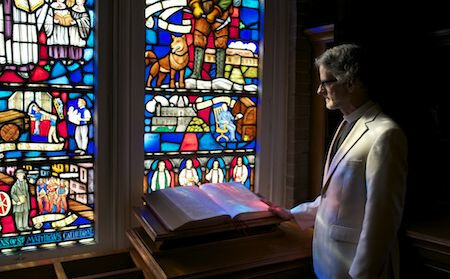Hearing

The Bible seems to distrust seeing. In Genesis chapter 1, the sun and moon are demoted from the divine status that others accorded them. They are mere creatures, brought into being on the fourth day (note: there were three “days” without a sun—so clearly a “day” here is not something that depends on the sun for its meaning). Moreover, the author doesn’t even deign to name them; he says, instead, “the greater light” and “the lesser light.” Seeing has led many people to paganism. We, the Bible seems to say, must learn to listen to God. The godly task is to learn to hear.
To hear what? The Word was with God in the beginning, indeed was God. “And God said, ‘Let there be light.’”
Before the Word was made manifest—before we could see his glory—the woman who is the consummation of the preparation, the Virgin Mary, has to hear correctly. The angel appears to her—and just so, there is seeing involved—but Mary must hear Gabriel’s voice, must hear and understand his words.
If you say daily Morning Prayer, you know the line from Psalm 95: “Today, if ye will hear his voice. . . .” Or, in the 1979 Psalter, “Oh, that today you would hearken to his voice!” It is evidently very important for us to learn to hear.
---
He was ten years old when he first heard it. “I want to follow you,” he said, “I just need to grow up first.
When he was twenty-two it came again. “I just finished college, and now I need to do some living. But then I’ll listen; I won’t be young forever.”
And when he was thirty? “I have to work so hard; the children, the bills. I haven’t forgotten you, just I can’t right now.”
And when he was forty, he heard something that reminded him of a longing deep buried somewhere inside him. But he didn’t have time to dig for it.
He was about fifty-five when it came again. “I’m at the height of my career; things are going so well. This is a great time of life.”
At his retirement, the voice spoke again. “Sorry,” he said, “but I worked so hard for so long for the company, the family. Now it’s time for me to think about myself.”
And when he was seventy-five, the voice came again, but he was unable to hear it.
---
To hear the voice of God is to respond: in the present, where we are, with all that we are. It’s very simple. When you hear the voice, just say, “Be it unto me according to thy word.” Or say, “Here I am; I’m yours.”
To put off the voice—to resist the discipline of hearing—is to risk deafness. “Today if ye will hear his voice, harden not your hearts.” Imagine Mary is in front of you. She is saying, “Repeat after me.”
---
Out & about. This Sunday, December 18, I will be teaching on the Song of Songs at Church of the Incarnation, 3966 McKinney Ave., Dallas. The class is in the Memorial Chapel at 10:20. Visitors are of course welcome. Previous sessions on the Song of Songs are posted here: https://incarnation.org/class-recordings/

